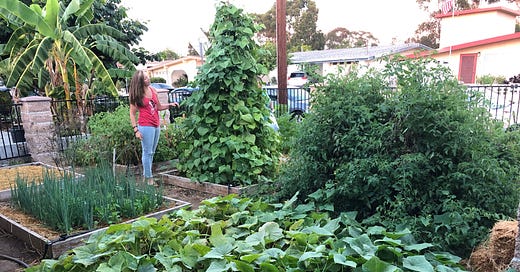
Bayside’s Kim Heinle checks out the Co-Op Garden
Face it. Your mom was right! You might have thought she was merely giving you a hard time when she said “Eat your vegetables”, but in doing so she was actually dispensing some great advice, as well as expressing her food trendiness.
Needless to say, fruits and vegetable are a critical component of any healthy diet. Furthermore, the results of a recent food association’s survey reported that 67% of consumers claimed to have bought more vegetables in 2019 than in the previous year, while 73% said they were buying a larger variety of produce than twenty years ago. Apparently, fruits and vegetables have attained the “hip” status your mom always predicted.
A harsh reality, however, is that there are segments of San Diego county’s population without regular access to fresh produce, the unfortunate consequence of food insecurity. According to the San Diego Food Bank, food insecurity is defined as having little to no food available at home, as well as not knowing where the next meal will come from. 450,00 San Diego county residents face insecurity every day. Currently 1 in 7 adults face food insecurity—the figure is 1 in 5 for children.
Fortunately, Linda Vista’s own Bayside Community Center is doing its part to address food insecurity by providing local residents in need with access to fresh fruits and vegetables.

Bayside’s Urban Farmer Amy Zink prepares produce for distribution
Bayside’s Urban Agricultural program has taken on this challenge by growing produce locally through its Co-Op Garden Model and partnering with San Diego Co-Harvest to get fresh produce into the hands of those who are most impacted by food insecurity.
As explained by the program’s coordinator, Amy Zink, the Bayside Urban Agricultural program has focused on the following objectives:
Growing food locally and delivering produce to the homes of seniors in need (prior to the COVID-19 pandemic the food was available at Bayside for pick-up).
Administering a hands-on education garden model that teaches local residents how to take control of their health by learning urban farming techniques and water conservation methods in order to grow food in a small space. Prior to the pandemic, this hands-on education model used the on-site plant nursery to host Kearney High students with special needs to grow starter plants, learn job skills, and participate in hands-on work that gave back to the community.
Working with the City of San Diego Parks and Recreation department to advocate for the rental plot portion of the Linda Vista Community Garden to have a permanent home in the Linda Vista Community Park. This garden will allow local residents to farm their own small plots, an opportunity especially relevant for apartment dwellers who don’t have available space for a garden.
A significant achievement for Bayside’s Co-Op Garden Model has been its first Linda Vista Co-Op Garden. Ms. Zink defines this Co-Op Garden as a cooperative relationship between a forward-thinking landlord and a tenant who agreed to grow produce in her front yard and donate the produce to Bayside in return for a reduced rent.
As a result of this effort, the tenant has been able to donate 500 pounds of produce grown in her 225 feet of front yard growing space
The back yard was also converted into a garden and was eventually used to become San Diego Co-Harvest’s first Micro Farm.

San Diego Co-Harvest’s first Micro Farm in Linda Vista backyard
Bayside maintains an important partnership with San Diego Co-Harvest to obtain and grow food for those in need. This non-profit organization, headed by founder Avery Cramer, aims to provide people with “the benefits of fresh foods while also incentivizing their sovereignty over their own health and nutrition.” This is done by obtaining excess residential, commercial or educational space to grow food for those who are food insecure. During the past six months this organization’s efforts have resulted in growing and distributing 5000 pounds of food to Bayside.

Produce ready for distribution
Additionally, in its effort to fight food insecurity, Bayside has also worked with organizations like Mesa College, Francis Parker School, and Charlie’s Best Bread to accept donations of bread, produce, and food staples for their food pantry, and has also collaborated with San Diego City Schools for food distribution.

Bread distribution from Charlie’s Best Bread
Though the COVID-19 pandemic has cast a dark shadow on everyone’s lives, it is great to see an effort like Bayside’s Urban Agriculture program continue to thrive and make such a positive contribution to the community.
If you are interested in helping Bayside take on the challenge of food insecurity by donating seeds, donating produce, or participating in the Co-Op Garden Model by making space available for a garden, please contact Amy Zink (azink@baysidecc.org).
****
If you haven’t already done so, please hit the “Subscribe now” button to ensure you are on automatic distribution for every post.




how does one receive donated produce and how does one volunteer to grow?